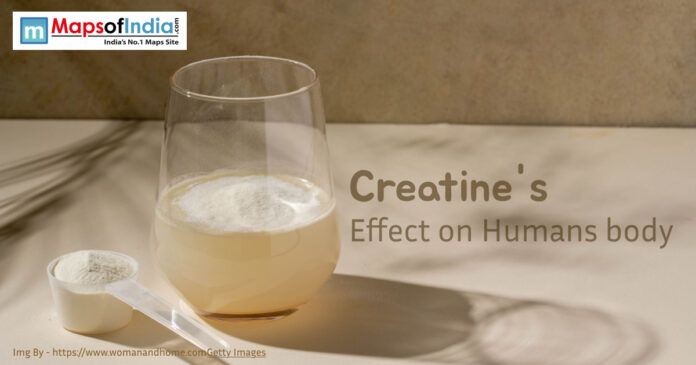Creatine is among the most examined as well as common supplement on the planet, specifically in sports, muscle building, and also fitness. It’s a naturally occurring compound that occurs in small amounts in foods such as red meat and fish, and is produced by the human body in the liver, kidneys, and pancreas. However, many boosters took creatine as a complement, to support their performance, and power.
Although creatine seems to be one of the most used supplements out there, there is a lot of discussion about the impact of this compound on the human body. It has some claiming it does wonders for athletic performance and brain power, and others worrying it has side effects. This article explains how creatine affects human physiology as well as the potential benefits, side effects, and long-term effects on human health.
What is Creatine?
Creatine is a nitrogenous organic acid that is part of adenosine triphosphate (ATP) production, the primary energy currency for our cells. Stored primarily in muscle (95%), it’s utilised during short, high-intensity activity whenever the body is summoned to supply fast eruptions of energy, as when weight lifting, sprinting and jumping.
Creatine is most often sold as a dietary supplement as creatine monohydrate, but there are several different forms available (including creatine ethyl ester and creatine hydrochloride).
How Creatine Works in the Body
Creatine supplements increase phosphocreatine stores in muscles. Phosphocreatine replenishes ATP, which becomes quickly exhausted during high-energy activities. In this way, creatine enables athletes to prolong high-intensity bouts by restoring ATP levels.
Stages of Creatine Action
- Absorption: Creatine also passes into the bloodstream after ingestion and gets absorbed by muscle cells.
- Storage: The muscles keep creatine as phosphocreatine, a kind of energy reserve.
- Utilisation: During high-energy-demand activities, empirically-transcribed phosphocreatine is directly conjugated to adenosine triphosphate (ATP).
- Recovery: After exercise, creatine has been found to help restore ATP stores, which supports muscle recovery and decreases fatigue.
Benefits of Creatine on the Body
Here are some key benefits:
-
Improves Strength and Power Production
- Boosts ATP production for optimal performance of your muscles during high-intensity exercises.
- Aids in lifting larger weights and executing additional repetitions in strength training
- Creatine supplementation can assist muscle performance because of its ability to improve power output by 5-15% in studies.
-
Supports Muscle Growth
- Aids in muscle protein synthesis and muscle hypertrophy (growth).
- Makes you look fuller by forcing water into the muscle cells (cell volumisation)
- Promotes satellite cell activation to help repair and regenerate muscle.
-
Boosts Athletic Performance
- Perfect for short bursts of high-intensity exercise, like sprinting, weightlifting, and jumping.
- It reduces muscle fatigue, so people can do longer and more intense workouts.
- Decreases muscle fatigue, enabling longer, more intense workouts.
- Great for developing explosive power and speed, so if you are an athlete in a sport like football, basketball, or wrestling, this is great for you.
-
Speeds Up Muscle Recovery
- Decreases muscle damage and inflammation after exercise.
- Reduces levels of creatine kinase (CK), a marker of muscle damage.
- Reduces recovery time between workouts, allowing you to train often.
-
Improves Brain Function and Cognitive Performance
- Offers additional ATP for the brain, and supports memory, focus and problem-solving.
- Potentially protective against cognitive decline in older adults.
- It is shown to enhance mental performance in sleep-deprived people.
- Possible advantages for neurodegenerative diseases, like Parkinson’s and Alzheimer’s.
-
Reduces Fatigue and Tiredness
- Helps combat mental and physical fatigue by restoring ATP stores.
- Good for chronic fatigue syndrome patients or people under high physical exertion.
- May also enhance energy and mood in those with low creatine (vegans, non-meat eaters).
-
Helps to Treat Neurological Disorders
- Assists in the repair of muscle function in muscular dystrophy patients.
- It may slow the progression of Parkinson’s disease in combination with exercise.
- Has the potential to treat a number of different MS (multiple sclerosis) symptoms.
-
Better Bone Health and Prevention of Age-Related Muscle Loss
- All help to preserve muscle mass in older adults, thereby decreasing the risk of sarcopenia (age-related muscle loss).
- May promote bone density, reducing the risk of osteoporosis.
-
No Serious Side Effects for Young, Healthy People
- Creatine is one of the most well-studied supplements, and research confirms it is safe to take long-term.
- It does not harm the kidneys or liver in healthy individuals who take the recommended doses (3-5g/day).
What Are the Potential Side Effects of Creatine?
There are a variety of creatine benefits, but it has also seen some myths and fears about the safety of creatine.
Here’s a rundown of adverse effects, according to scientific studies:
-
Too much weight and holding water.
Creatine pulls water into your muscle cells, and that can make you gain body weight. That’s awesome for muscle volume, but not everyone’s a fan of that rapid-bodied addition.
-
Gastrointestinal Discomfort
Others might develop stomach cramps, bloating or diarrhea at greater doses of creatine. Taking small doses and drinking lots of water can help reduce this.
-
Kidney and Liver Problems (Myth vs. Reality)
Some hypothesized that creatine may harm the kidneys or liver. However, studies show creatine is safe for healthy people when taken at doses of 3–5g/day or as recommended.
-
Dehydration and Muscle Cramps (Myth)
Others believe creatine causes dehydration and cramping. But studies indicate the use of creatine can actually promote overall hydration by elevating the water levels within muscle. Drink enough water to stave off cramps.
-
Hair Loss (The Theory of Increase of DHT)
Some research suggests creatine may increase levels of dihydrotestosterone (DHT), a hormone linked with hair loss. Research on this is limited, though, and a direct link hasn’t been definitively established.
Who Should Take Creatine?
Creatine is appropriate for different populations, including:
- The Health of Athletes & Bodybuilders: For strength, endurance, and muscle mass.
- Older Adults: To help prevent muscle loss and improve cognitive function.
- Vegetarians & Vegans: People who follow a plant-based diet generally do not get enough creatine from their food, so supplementation creates an improvement.
- People with Neurological Disorders: For the health and functioning of the brain.
Who Should Avoid Creatine?
- People with kidney disease should talk to a doctor before using creatine.
- Those with harrowing digestive woes might try lower doses.
How to Take Creatine
-
Loading Phase (Optional)
- 20g per day (divide into 4 doses) for 5- 7 days
- Aids in rapid muscle stores saturation
-
Maintenance Phase
- 3-5g per day
- Can be consumed before or after exercise
-
Cycling Creatine (Not Needed)
- Some individuals cycle creatine (e.g., 8 weeks on, 4 weeks off), but this practice is not necessary, as long-term use is safe.
Best Time to Take Creatine
- After workout: Potentially somewhat advantageous for uptake in muscle
- Anytime: Creatine accumulates over time, so timing is not critical
Conclusion
Creatine has been one of the best supplements to perform better both physically and mentally for a long time. If you’re an athlete wanting to perform at your best, an older adult hoping to kick age-related muscle loss in the teeth, or a human being who just wants to stay mentally sharp, creatine can make a world of difference. When used appropriately, sufficiently hydrated, and within recommended dosing guidelines, creatine is one of the most powerful tools in our toolbox to maximally optimize human health.




